The Importance of a Sinking Fund in an Owners’ Management Company
An article published in the property section of the Galway Advertiser , March 9th 2023.
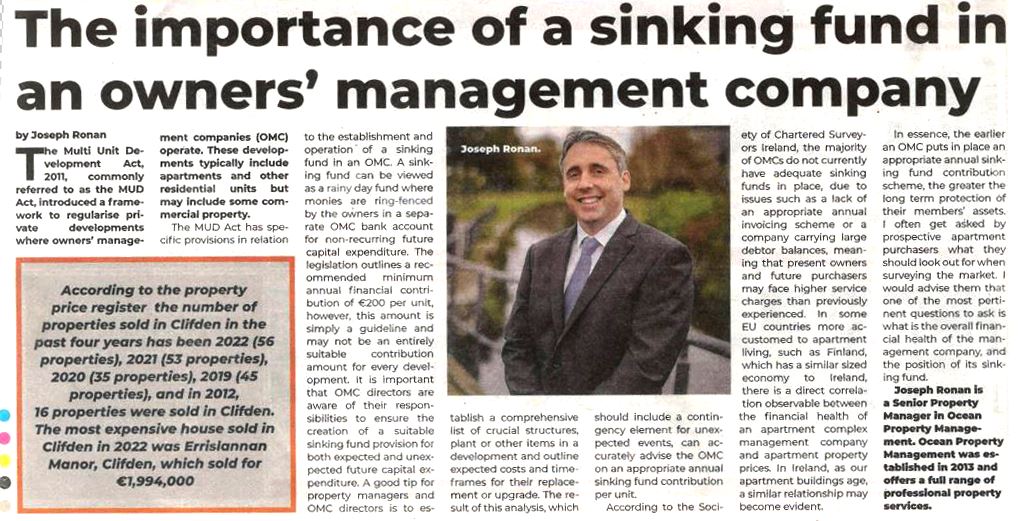
The Multi Unit Development Act, 2011, commonly referred to as the MUD Act, introduced a framework to regularise private developments where Owners’ Management Companies (OMC) operate. These developments typically include apartments and other residential units but may include some commercial property.
The MUD Act has specific provisions in relation to the establishment and operation of a sinking fund in an OMC. A sinking fund can be viewed as a rainy day fund where monies are ring-fenced by the owners in a separate OMC bank account for non-recurring future capital expenditure. The legislation outlines a recommended minimum annual financial contribution of €200 per unit, however, this amount is simply a guideline and may not be an entirely suitable contribution amount for every development. It is important that OMC directors are aware of their responsibilities to ensure the creation of a suitable sinking fund provision for both expected and unexpected future capital expenditure. A good tip for property managers and OMC directors is to establish a comprehensive list of crucial structures, plant or other items in a development and outline expected costs and timeframes for their replacement or upgrade. The result of this analysis, which should include a contingency element for unexpected events, can accurately advise the OMC on an appropriate annual sinking fund contribution per unit.
According to the Society of Chartered Surveyors, Ireland the majority of OMCs do not currently have adequate sinking funds in place, due to issues such as a lack of an appropriate annual invoicing scheme or a company carrying large debtor balances, meaning that present owners and future purchasers may face higher service charges than previously experienced. In some EU countries more accustomed to apartment living such as Finland, which has a similar sized economy to Ireland, there is a direct correlation observable between the financial health of an apartment complex management company and apartment property prices. In Ireland as our apartment buildings age a similar relationship may become evident.
In essence, the earlier that an OMC puts in place an appropriate annual sinking fund contribution scheme, the greater the long term protection of their members’ assets. I often get asked by prospective apartment purchasers what they should look out for when surveying the market. I would advise them that one of the most pertinent questions to ask is what is the overall financial health of the management company, and the position of its sinking fund.
Joseph Ronan is a Senior Property Manager in Ocean Property Management. Ocean Property Management was established in 2013 and offers a full range of professional property services.
OPM FIX #MAINTENANCEMADEEASY

INTRODUCING OPM FIX
LOG YOUR MAINTENANCE ISSUE ANY TIME ANY DAY WITH A CLICK OF A BUTTON!
Our aim was to make logging of maintenance issues as easy and streamlined as possible. The maintenance request is directed to our facilities team through our CRM (database). It allows to capture essential information to address the issue as smoothly as possible.

STEP 1
Go to our website athttps://oceanpm.ie and choose OPMFix from the top menu, or the bottom menu on your mobile.
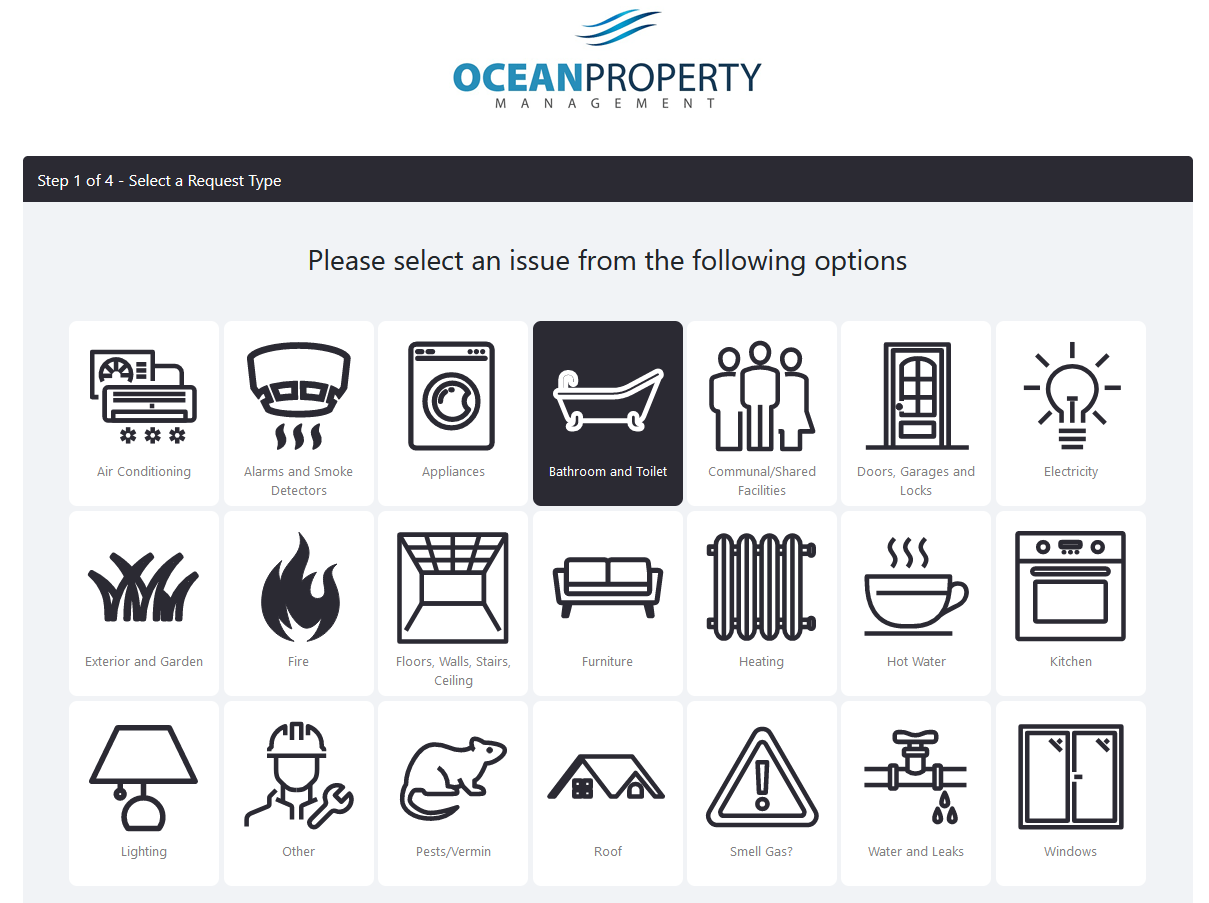
STEP 2
Narrow down the category of request to help us deal with the issue better.
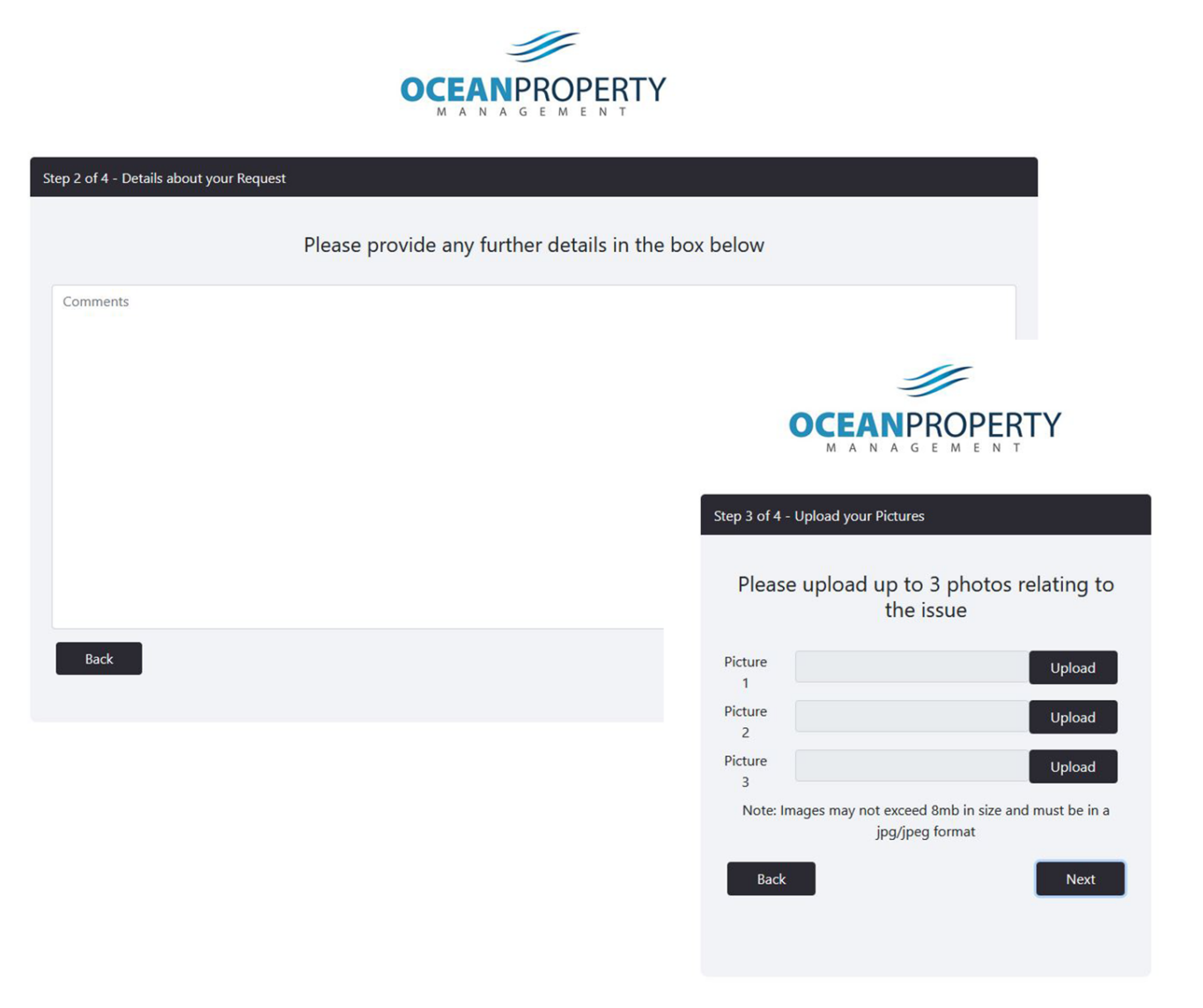
STEP 3
Provide further details, description,photographs, so our maintenance team comes well prepared to carry out the job.

STEP 4
SIT BACK AND RELAX.
OUR FACILITIES TEAM IS ON IT!
Added Benefits to Power Washing Your Property
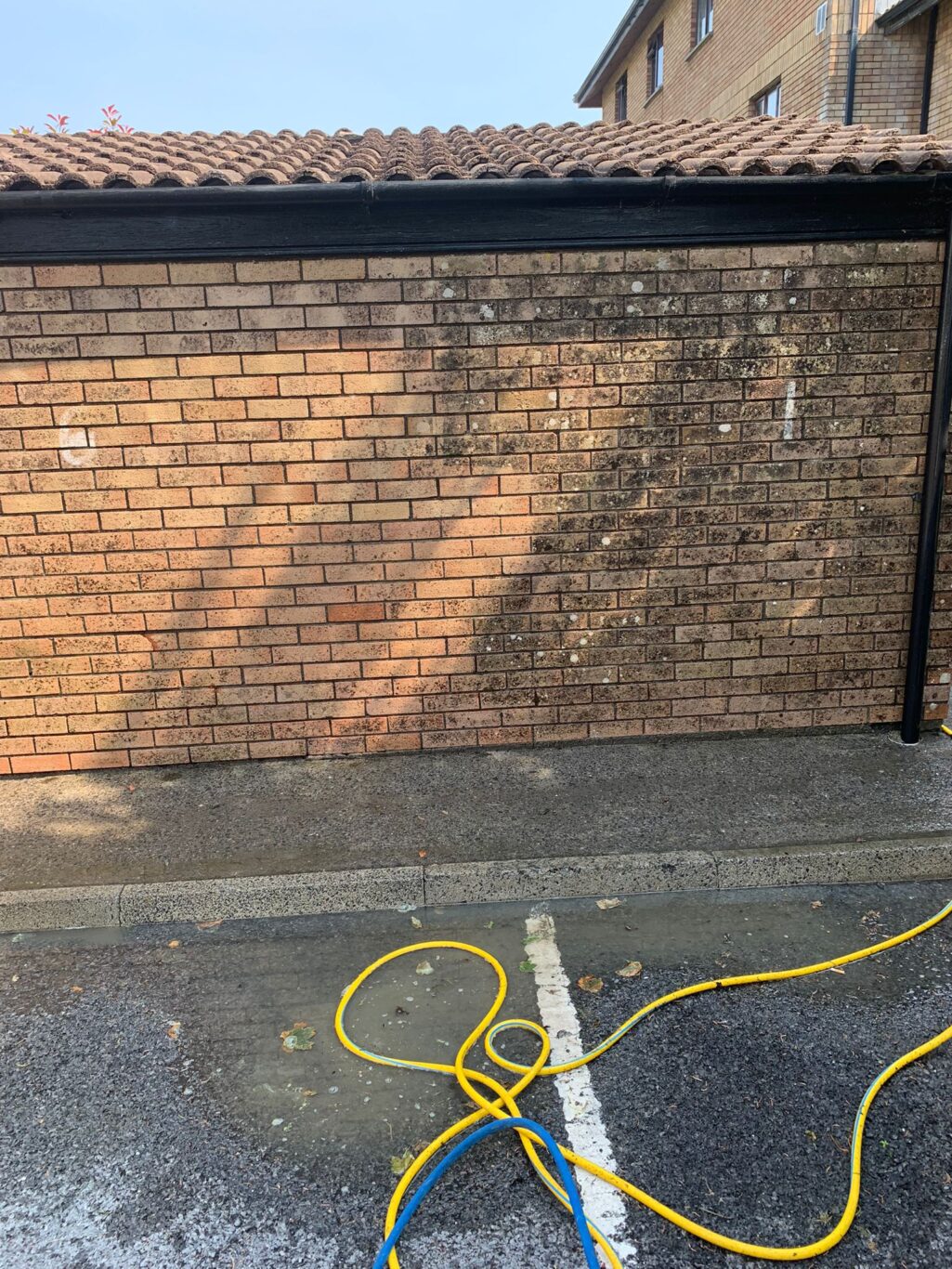
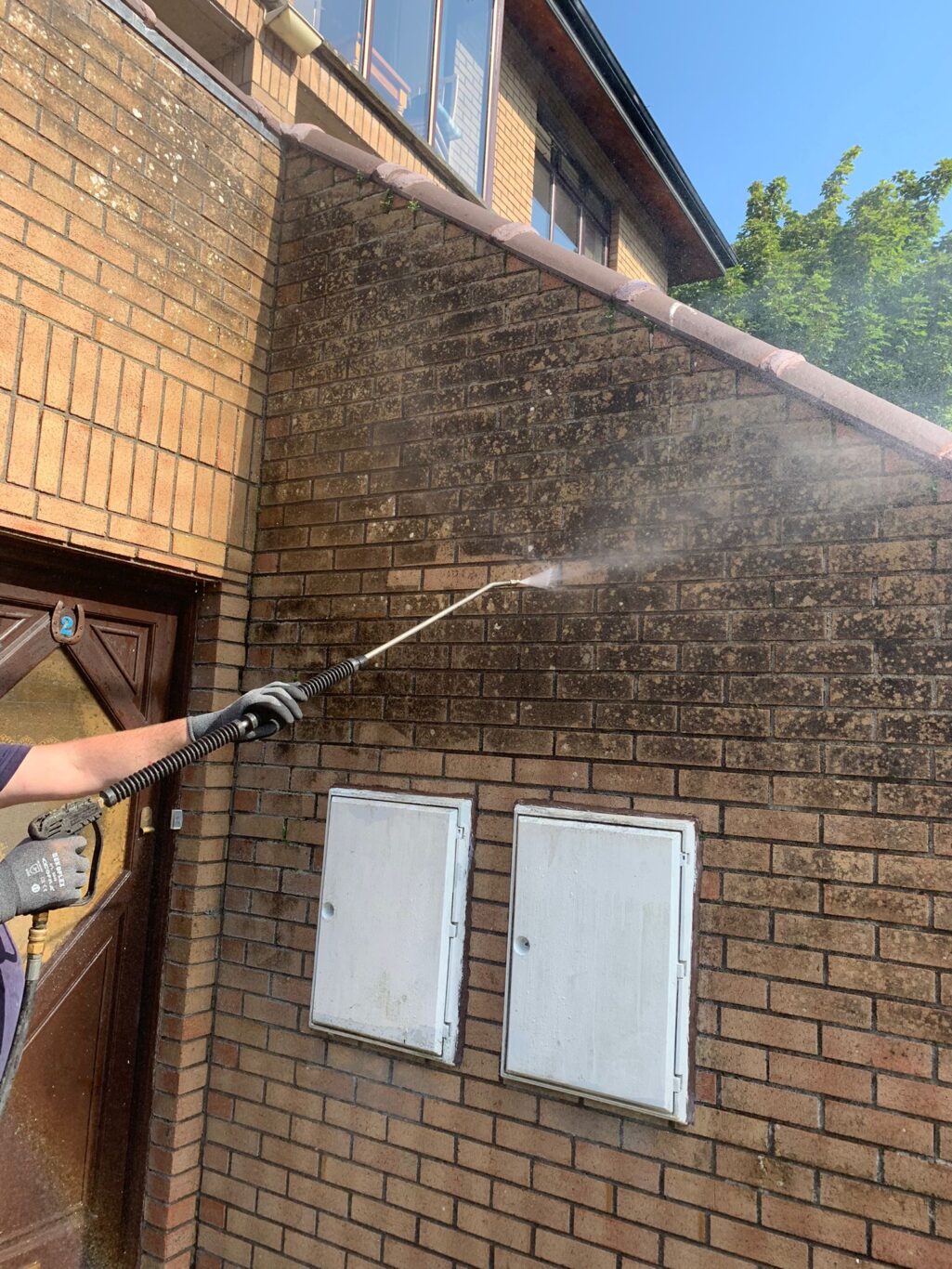
Thinking of Power washing your property? Here at Ocean Property Management, we manage a number of properties around Galway and, are equipped to handle all your properties power washing needs. In addition to removing built up dirt and grime power washing can also have some added benefits that you may not have considered before.
- Improve your Buildings curb appeal.
It never hurts to boost your buildings curb appeal, whether your building’s owner is looking to sell or lease out the space. Regularly having your building power washed by professional cleaners will make the building look newer and more aesthetically appealing to both onlookers and potential tenants.
- Prevent repairs:
Certain building materials, such as brick, may deteriorate over time if left unwashed. Bird droppings, mould growth, algae and dirt build up are all contributing factors to the wearing away of a buildings structure, as well as looking unattractive. For example, the acidity in bird droppings can weaken the roofs and gutter systems of commercial properties potentially leading to a collapsed roof or break. Simply cleaning the droppings regularly can reduce the risk of structural damage. Regular power washing of walls, windows, roof, and gutters can help cut down these risks and in turn, saving the business money in maintenance costs in the long run.
- Clean associated spaces:
Its not just the walls, windows and roof that benefit from professional power washing, other exterior spaces associated with the building can be power washed as well. Footpaths and walkways in front of a building are some of the most popular and frequented spaces to be power washed. Power washing the paths can remove unsightly gum and rubbish stains caused by regular public use.
- Promote health and protecting against injury:
Power washing can improve the surrounding environment for people in the building by eliminating potentially harmful substances. Pollutants, dust, pollen, dirt, mildew, algae, and bird droppings can all lead to negative health effects, such as trouble breathing, allergies and in some cases disease. When done regularly power washing can help prevent this from happening.
Consistent cleaning can also help prevent slips and falls, power washing the footpaths and other surfaces can help get rid of grease, mould, and other substances that cam cause someone to slip and hurt themselves.
- Get rid of Graffiti:
When it comes to commercial buildings a persistent problem that business can have, is the appearance of graffiti. While it may not hold the same structural or safety risks as mould or bird droppings, graffiti and spray paints can be among the most offensive and unsightly stains on a building. Power washing can help remove the paint and give your building the respectable and professional look that it needs.
Attached are some photos taken by our maintenance team, while hard at work blasting some of the built-up dirt and grime from buildings under our care around Galway so that they remain as appealing and pristine on the outside, as they are on the inside.
Choosing the right Letting Agent!
Follow these three tips when choosing the right Letting Agent to manage your property.

1. Research local Letting Agents.
Once you know what you’re looking for, it’s time to draw up a shortlist of possible letting agents. Take a look at online listings, check forum discussions, and ask other local landlords for recommendations.
It’s worth checking whether agents are well-reviewed by tenants as well as landlords, as a poor experience with the letting agent could discourage a tenant from remaining in your property, or even from renting it in the first place.
2. Check is the Letting Agent marketing savvy!
Ensure that the letting agent has a proactive attitude to marketing rental properties, and that they will use a number of strategies to find tenants for your house or flat.
Check their property listings on a property portal to see if they market rental properties well, and to see whether they’ve successfully rented out many properties in your area recently.
3. Ask about your future relationship with the Agents.
Make sure that you’re happy with the way the letting agent will deal with you as a client. These are a few things that are worth checking.
Opening hours
Some letting agents are only open during weekday working hours, which could be an issue for you as a landlord and for tenants and prospective tenants. Ask whether anyone at the agency will be available during evenings and weekends.
Paperwork
Confirm with the letting agency how they will handle rental-related paperwork, such as references, credit and employment checks, and tenancy agreements. For example, will they give you the chance to review any references they receive for prospective tenants? As long as they get the tenants’ agreement, they’re legally allowed to do this.
Repairs and maintenance
If you’ve chosen a management service, ask the letting agent how often they carry out inspections, how the tenants can contact them if they have a maintenance issue, and if they have a panel of trusted tradespeople who they use.
Money transfers
Speak to the letting agent about how they will handle the rental finances, including the rent received and costs and fees: how often will they transfer balances to your account, and will you need to provide a “float” to pay for any maintenance issues?
Notice periods
It’s important to find out how long the letting agent’s notice period is so that you know what happens if you want to end the relationship. Most letting agents require two months’ notice in writing to end a rental management contract.
Want to know more about our letting service?
Summer Home Maintenance Tips!
This Summer Home Maintenance Guide includes tips to make the most of the dry months and give your property some TLC!

1. Improve the landscape of your home.
If you were unable to get to your home’s garden during the spring, it’s not too late! The summer is a fantastic time to work on your green thumb, to beautify the appearance of your home. Consider adding mulch to the garden beds, which create a clean appearance. Mulch reduces weeds and locks in moisture, keeping plants healthier during the hot temps. Also, prune flowers, bushes, and trees, so they’re away from your home’s exterior, roof, and central AC unit.

2. Update or give your decking some TLC!
Check your deck to see if any boards look like they’re rotting. Have them replaced. Pour water on your deck to see if the boards should be resealed. If the water beads into small puddles, it is okay. If it sinks into the wood, you should reseal it to protect against water damage.

3. Upgrade old windows and doors.
Windows should shut properly to maintain temperature control. Check the sealant around indoor and outdoor windows and replace if necessary.

4. Check your home’s insulation.
You can find insulation issues pretty much anywhere throughout your house, from the front door to the attic, to cracks in your garage door (especially if the garage is attached). With higher cooling costs in the summer, now is time to seal any insulation gaps you may encounter.

5. Inspect your attic or basement.
Check both the basement and attic for evidence of pests, insects, water damage, mold, or mildew. Turn off the lights to check for any sign of peeking daylight.
For more tips and advice on your property follow our Social Media Channels.
Property maintenance tips!

Here is our complete property maintenance guide for all seasons to help landlords or home owners!
WINTER!
1. Trim your trees
With the leaves gone, you can assess whether trees or shrubs surrounding the property could do with pruning. If there are branches that are looking unsteady and might pose a health and safety hazard, it is better to cut them back now in a controlled way than have them come down in bad weather. Before carrying out any work it is also worth checking whether the tree is subject to a tree preservation order, particularly if the property is located in a conservation area.
2. Boost insulation
Draught proofing is one of the cheapest and most effective ways to insulate and save energy; check for any gaps in windows and doors and use sealant to help keep the cold weather out and moisture levels down. A quarter of the heat from a property is lost through an uninsulated roof, so don’t forget to check the loft. Heat will always flow from warm areas to cooler ones so make sure your tenants encourage the circulation of heat around the property. They will appreciate the reduction in heating costs, and you will be helping to protect your property from condensation and damp.
3. Lag water tanks and pipes
Lagging water tanks and pipes reduces the amount of heat lost, so it costs less to heat water and hot water stays hotter for longer. Lagging pipes also helps stop them freezing and bursting when the temperature drops. Hot water cylinder jackets, pipe insulation and radiator reflector panels on external walls are all low cost, easy to install and will reduce the escape of heat.
4. Communicate with your tenants
Offering your tenants helpful advice on how to stay safe and warm can strengthen your relationship and help ensure your tenants are taking care of themselves and your property. Ask tenants if there is anything they are having problems with – any drafts or dripping taps for example. Even a trickle of water could freeze and block pipes.
SPRING!
1. Turn on the taps
If you have outdoor taps, turn them on to see how much water is coming out. If it is very little, there is a chance that the pipes could have been damaged during the cold weather.
2. Inspect the wood
Warmer weather after the onslaught of winter provides perfect conditions for wood rot. If there are areas of the property where protective paint has come away, look for rotting wood and get any affected areas seen to before they deteriorate further.
3. Bolster your fence
If the fence has taken a battering during winter, get it summer ready now by carrying out repairs.
4. Watch the cracks
It is not just the roads that suffer damage in cold weather. Have a look around your rental property’s patio and driveway to see if there are any cracks. Minor ones could be easy to fix yourself, preventing them from turning into unsightly crevices which might present a trip hazard to your tenants.
SUMMER!
1. Bleed the radiators
Trapped air bubbles reduce the efficiency of your heating system and can also lead to damp spots. Bleeding the radiators when they are unlikely to be in use can get rid of these air bubbles, so they are ready to fire on all cylinders come winter.
2. Clear drains
It often takes a drain stuffed with dead leaves to spur a clear out. But how many times do you see them becoming overwhelmed in the midst of a summer downpour? Give the drains on your rental property the best chance to do their job by seeing to them all year round.
3. Get your boiler serviced
Avoid the desperate phone call from your tenants informing you their boiler has gone on the blink four months down the line by getting a qualified engineer to service it in plenty of time. Doing this in summer means that if there is a problem, it can be fixed well in time for the winter.
4. Get painting
Exterior paint does not just improve a property’s kerb appeal if you are between tenants, but it also protects window frames and doors. Spells of warm, dry weather are the best time to do this as allowing the paint to bond to wood that is not damp will make the finish more durable.
AUTUMN!
1. Wrap up the summer
Cover or store untreated wooden furniture you don’t want to see damaged and fold away the hosepipe, being sure to empty it of any residual water. If you have any delicate plants, now is the time to bring them indoors before they are damaged by the first frost. Clear any fallen leaves and other debris and don’t forget to plant bulbs for a spring display next year!
2. Check outdoor lights
Thanks to the clock change, long nights are swiftly dropped on us, which can be a shock to the system. Make the evenings easier for your tenants when they are trying to find their house keys in the dark by replacing any bulbs that have gone from outdoor lights.
3. Clear your gutters
This is a job best left to late autumn when the majority of leaves have been shed but before it gets so cold that water will freeze in the gutters, causing them to pull away from the building or bursting your pipes. Icicles may be pretty, but they are also potentially dangerous.
4. Take a look at your roof
While you are up there, see if you notice any slipped or broken tiles, weathered flashing or cracked caulking. It will be easier to get someone in to fix any problems now than a couple of months down the line when daylight and fair weather are in short supply.
We take care of the legalities of lease agreement and collect electronic signatures. If you do not have the time or inclination to deal with the letting & management just leave it all to us with our Full Management package.
Checklist for selling your home!
There are a lot of things to consider when selling your home and you’re guaranteed to be feeling a mixture of emotions about the situation which can be really overwhelming and quite distracting. There are lots of steps in the process leading up to selling a property, all of which are incredibly important, so ensuring that you are well informed about the process can be really beneficial.
There is no denying that selling a house in Ireland can be difficult if you have no idea where to start.
Here are a few tips!

1. GET YOUR PROPERTY VALUED!
Knowing how much you can expect to sell your property for will help you when sorting out your finances and searching for a new property to purchase. Alongside market valuation, it is also beneficial to know what other properties on the market your home will be competing with, get in touch with us today and we can help.

2. ORGANISE YOUR LEGAL DOCUMENTS.
Another important step is getting in touch with a solicitor. Your solicitor will then be able to request the title deeds and supporting documentation for your home. These are usually held with your bank if you still have a mortgage on the property. If you don’t have a mortgage then your solicitor will draft contracts for sale so that they are ready to issue as soon as the property is sale-agreed. Completing this step early can help to eliminate potential delays further down the line. Documents needed when selling your property include proof of identity, planning documentation, PPS number, marital status, title maps, NPPR certificate, BER cert and title deeds. Our sales team can manage the headache of this for you.

3. GET A BER CERT FOR YOUR HOME!
You must ensure you have an up to date BER cert before selling your property. This is a mandatory certificate that almost every property being sold must have and provide to the buyer. The cost of a BER cert varies depending on the size and type of property, but generally costs in the region of €120-€220.

5. PREPARE YOUR HOME AS BEST AS POSSIBLE!
Like anything your home has to be marketed, and fixing up minor issues and painting old bathrooms and windows can help improve the look and attraction of your property.
Every property we sell has something wonderful and unique about it. The secret is how to let it show and let your buyers fall in love with it.
- We support you through every stage of the sale process.
- We don’t just advertise your property. We’ll actively help you present it so that it generates as much interest as possible.
- We can deploy a team of in-house tradesmen to help you refurbish your property before we bring it to market.
- We use the latest technology to market your property (professional photography, video tours).
- We offer unbeatable savings in commission.
ATTRACTIVE COMMISSION
ONLY 1% OF THE SALE PRICE
GET STARTED TODAY!
Property rebuilding costs
The Society of Chartered Surveyors Ireland published their Guide to House Rebuilding Costs last month. The guide is intended to assist homeowners in insuring their homes and explain some of the more important aspects of house insurance.
The Guide shows that national average rebuild costs have increased by an average of 4% in 2015 (from 3% in Dublin to 6% in Galway and Waterford). The SCSI said that the increase in rebuilding costs means homeowners could be facing pro-rata increases in house insurance premiums.
Andrew Nugent, President of the Society of Chartered Surveyors Ireland (SCSI) said “The increase in rebuild costs is mainly due to increases in construction material prices and also due to the new building regulations which were introduced last year.”
“The key for homeowners is to check that their house rebuilding costs – the reinstatement costs involved in rebuilding a house in the event of a catastrophe such as a fire which are required on all home insurance premiums, are adequate and fully in line with current figures. Homeowners need to check the ‘sum insured’ on home insurance premiums to ensure they are fully covered and not over or underpaying”.
To download the House Rebuilding Cost Guide 2015, please click here.
To use the online House Rebuilding Calculator, please click here.
Banks to cut interest rates for variable mortgages
It is said that homeowners with standard variable mortgages (SVR) are likely to benefit from reduced interest rates from July this year.
Minister for Finance Michael Noonan met with AIB, Bank of Ireland, Permanent TSB, Ulster Bank, KBC and ACC to discuss variable rates currently being charged by the banks.
Reducing the cost of mortgages might come from:
- straight rate cut
- offering a lower fixed-rate
Mr Noonan warned the banks that if they do not take steps to lower the cost of mortgages, bank levy could be introduced in the Budget.
More details can be found in Irish Times online.